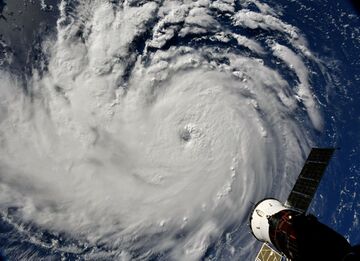Hurricane Alberta: Difference between revisions
No edit summary |
No edit summary |
||
| Line 46: | Line 46: | ||
==Meteoroligal history== | ==Meteoroligal history== | ||
According to [[Zamastanian Oceanic and Atmospheric Center]] (ZOAC), Alberta formed as a tropical depression in the north-central [[Toyana Ocean]] on August 29th, 2001 as the result of the merger of a tropical wave and the remnants of another tropical depression four days earlier. | |||
==Preparations== | ==Preparations== | ||
===Federal=== | ===Federal=== | ||
Revision as of 16:17, 29 August 2021
| Category 5 hurricane | |
|---|---|
 Hurricane Alberta at its peak on September 4th, 2001, seen from the Coalition Space Station | |
| Formed | August 29, 2001 |
| Dissipated | September 12, 2001 |
| (Extratropical after September 8, 2001 -->) | |
| Highest winds | 3-minute sustained: 290 km/h (180 mph) 1-minute sustained: 305 km/h (190 mph) Gusts: 320 km/h (200 mph) |
| Lowest pressure | 925 hPa (mbar); 27.32 inHg |
| Fatalities | 737 deaths >3,500 injuries
|
| Areas affected | Southwestern Zamastan Tregueux, Anchorhead, Alenchon Janapa, Ossinia |
Hurricane Alberta was a large category 5 hurricane that caused 737 deaths, 3,500 injuries, and more than Z$63 billion in damage in early September 2001 along the coast of Southwest Zamastan, specifically in the city of Tregueux and surrounding areas. Alberta was the first named storm of the 2001 season. It formed on August 29th in the central Toyana Ocean, became a category 2 hurricane, and made landfall in Janapa on September 1st before growing in intensity once again over the Ossinia Sea and making landfall near Tregueux on September 4th as a category 5. It began to weaken as it continued moving inland, dissipating fully on September 8th.
Major flooding occured in Tregueux as multiple levee water protection systems failed and inundated much of the city's lowlying areas. The storm damaged many of Tregueux's main transport networks, like the Central Train System, leaving tens of thousands of people who had not evacuated the city prior to landfall stranded with little access to food, shelter, or other basic necessities. The scale of the disaster in Tregueux and, to an extent, Alenchon provoked massive national and international response efforts; federal, local, and private rescue operations evacuated displaced persons out of the city over the following weeks. The administration of President Cassious Castovia was criticized for a slow federal response to the disaster, as hundreds of people died and the damage became one of the most expensive natural disasters in the country's history.
Meteoroligal history
According to Zamastanian Oceanic and Atmospheric Center (ZOAC), Alberta formed as a tropical depression in the north-central Toyana Ocean on August 29th, 2001 as the result of the merger of a tropical wave and the remnants of another tropical depression four days earlier.